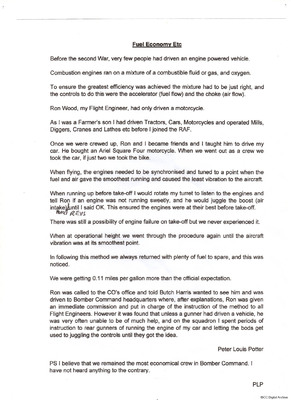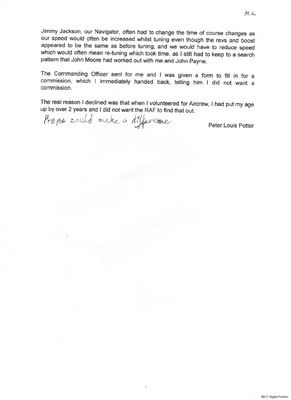Fuel economy etc
Title
Fuel economy etc
Description
Mentions combustion engines, pre-war driving and war-time personal transport. Describes handling aircraft engines and getting very economic miles per gallon. As result the flight engineer was promoted and put in charge instructing his method to others. Second page mentions their navigator's actions to aid fuel economy. Goes on to explain why the author did not want a commission.
Creator
Language
Format
Two page printed document
Publisher
Rights
This content is available under a CC BY-NC 4.0 International license (Creative Commons Attribution-NonCommercial 4.0). It has been published ‘as is’ and may contain inaccuracies or culturally inappropriate references that do not necessarily reflect the official policy or position of the University of Lincoln or the International Bomber Command Centre. For more information, visit https://creativecommons.org/licenses/by-nc/4.0/ and https://ibccdigitalarchive.lincoln.ac.uk/omeka/legal.
Contributor
Identifier
BPotterPLPotterPLv7
Transcription
[underlined]Fuel Economy Etc[/underlined]
Before the second War, very few people had driven an engine powered vehicle.
Combustion engines ran on a mixture of a combustible fluid or gas, and oxygen.
To ensure the greatest efficiency was achieved the mixture had to be just right, and
the controls to do this were the accelerator (fuel flow) and the choke (air flow).
Ron Wood, my Flight Engineer, had only driven a motorcycle.
As I was a Farmer's son I had driven Tractors, Cars, Motorcycles and operated Mills,
Diggers, Cranes and Lathes etc before I joined the RAF.
Once we were crewed up, Ron and I became friends and I taught him to drive my
car. He bought an Ariel Square Four motorcycle. When we went out as a crew we
took the car, if just two we took the bike.
When flying, the engines needed to be synchronised and tuned to a point when the
fuel and air gave the smoothest running and caused the least vibration to the aircraft.
When running up before take-off I would rotate my turret to listen to the engines and
tell Ron if an engine was not running sweetly, and he would juggle the boost (air
intake and revs until I said OK. This ensured the engines were at their best before take-off.
There was still a possibility of engine failure on take-off but we never experienced it.
When at operational height we went through the procedure again until the aircraft
vibration was at its smoothest point.
In following this method, we always returned with plenty of fuel to spare, and this was
noticed.
We were getting 0.11 miles per gallon more than the official expectation.
Ron was called to the CO's office and told Butch Harris wanted to see him and was
driven to Bomber Command headquarters where, after explanations, Ron was given
an immediate commission and put in charge of the instruction of the method to all
Flight Engineers. However, it was found that unless a gunner had driven a vehicle, he
was very often unable to be of much help, and on the squadron, I spent periods of
instruction to rear gunners of running the engine of my car and letting the bods get
used to juggling the controls until they got the idea.
Peter Louis Potter
PS I believe that we remained the most economical crew in Bomber Command. I
have not heard anything to the contrary.
PLP
Peter Louis Potter
[page break]
Jimmy Jackson, our Navigator, often had to change the time of course changes as
our speed would often be increased whilst tuning even though the revs and boost
appeared to be the same as before tuning, and we would have to reduce speed
which would often mean re-tuning which took time, as I still had to keep to a search
pattern that John Moore had worked out with me and John Payne.
The Commanding Officer sent for me and I was given a form to fill in for a
commission, which I immediately handed back, telling him I did not want a
commission.
The real reason I declined was that when I volunteered for Aircrew, I had put my age
up by over 2 years and I did not want the RAF to find that out.
[inserted]Props could make a difference[/inserted]
Before the second War, very few people had driven an engine powered vehicle.
Combustion engines ran on a mixture of a combustible fluid or gas, and oxygen.
To ensure the greatest efficiency was achieved the mixture had to be just right, and
the controls to do this were the accelerator (fuel flow) and the choke (air flow).
Ron Wood, my Flight Engineer, had only driven a motorcycle.
As I was a Farmer's son I had driven Tractors, Cars, Motorcycles and operated Mills,
Diggers, Cranes and Lathes etc before I joined the RAF.
Once we were crewed up, Ron and I became friends and I taught him to drive my
car. He bought an Ariel Square Four motorcycle. When we went out as a crew we
took the car, if just two we took the bike.
When flying, the engines needed to be synchronised and tuned to a point when the
fuel and air gave the smoothest running and caused the least vibration to the aircraft.
When running up before take-off I would rotate my turret to listen to the engines and
tell Ron if an engine was not running sweetly, and he would juggle the boost (air
intake and revs until I said OK. This ensured the engines were at their best before take-off.
There was still a possibility of engine failure on take-off but we never experienced it.
When at operational height we went through the procedure again until the aircraft
vibration was at its smoothest point.
In following this method, we always returned with plenty of fuel to spare, and this was
noticed.
We were getting 0.11 miles per gallon more than the official expectation.
Ron was called to the CO's office and told Butch Harris wanted to see him and was
driven to Bomber Command headquarters where, after explanations, Ron was given
an immediate commission and put in charge of the instruction of the method to all
Flight Engineers. However, it was found that unless a gunner had driven a vehicle, he
was very often unable to be of much help, and on the squadron, I spent periods of
instruction to rear gunners of running the engine of my car and letting the bods get
used to juggling the controls until they got the idea.
Peter Louis Potter
PS I believe that we remained the most economical crew in Bomber Command. I
have not heard anything to the contrary.
PLP
Peter Louis Potter
[page break]
Jimmy Jackson, our Navigator, often had to change the time of course changes as
our speed would often be increased whilst tuning even though the revs and boost
appeared to be the same as before tuning, and we would have to reduce speed
which would often mean re-tuning which took time, as I still had to keep to a search
pattern that John Moore had worked out with me and John Payne.
The Commanding Officer sent for me and I was given a form to fill in for a
commission, which I immediately handed back, telling him I did not want a
commission.
The real reason I declined was that when I volunteered for Aircrew, I had put my age
up by over 2 years and I did not want the RAF to find that out.
[inserted]Props could make a difference[/inserted]
Collection
Citation
P L Potter, “Fuel economy etc,” IBCC Digital Archive, accessed July 27, 2024, https://ibccdigitalarchive.lincoln.ac.uk/omeka/collections/document/30873.
Item Relations
This item has no relations.


